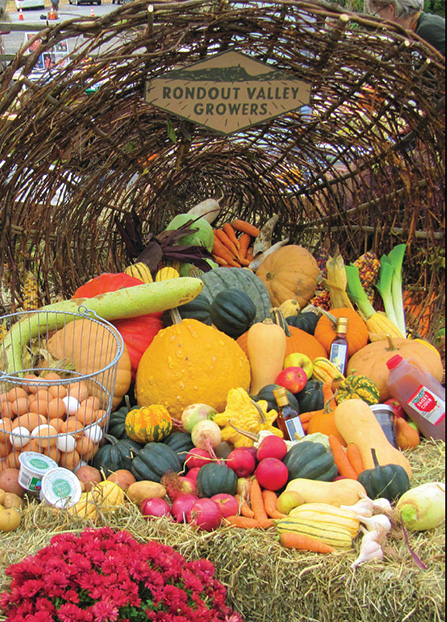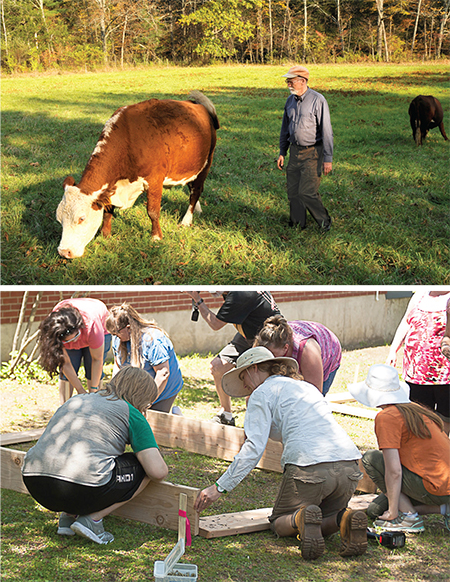
By its very nature, farming is a collaboration: with the soil, with the weather, and with neighboring farmers. The Rondout Valley has been shaped by this way of life for centuries, and the beautiful results can be seen in the stunning viewsheds around every curve and tasted at many a local eatery. Since 2003, however, the farmers of the Rondout Valley
have been experiencing the benefits of working together in a more unified way thanks to the Rondout Valley Growers Association, a farmer-led nonprofit on a mission to nurture economic and environmental sustainability by connecting people to each other and to the land that feeds us all.
The mission of keeping farming viable and the community fed has birthed an array of programs— Farm to Food Pantry, Farm to School, Farmer to Farmer, and Farm to Community initiatives are all going strong.

“We’re still small and kitchen-table,” says Deborah Meyer DeWan, executive director of the RVGA, “but people look to us for policy input, and we’ve become the go-to organization around food and farming. I think it works because it exemplifies what the heart and soul of being a grower is about: heart, integrity, practicality. Basically, the backbone of human existence.”
Back in 2003, development pressure was increasing and thirty or so farsighted farmers banded together under the leadership of Bruce Davenport and Chris Kelder to help keep farming viable. (Bruce’s family’s farmstand and nursery is the one on the corner of Cottekill Road and Route 209 in Stone Ridge; the Davenports have been growing in the Valley for five generations.) Now, approaching a fifteenth anniversary celebration, there are over 70 growers.
In an era of struggling farms, the Rondout Valley has seen about a dozen new ones get started. The current RVGA president, Nicholas (Nick) Cipollone, is a 30-something fourth generation Rondout Valley farmer with a young family. “We have farmers with hundreds of acres and others working a quarter-acre in an urban setting,” says Nick. “We have people in their 20s who are just starting out, and people in their 70s and 80s who are still on the tractor, brand-new farms and farms that go back two, three, five generations—one goes back thirteen generations.
We have community-supported agriculture farms and pick-your-own operations, farm stands and agritourism and educational programs. Our farmers grow everything you can imagine, from traditional sweet corn, veggies, and apples to microgreens and mushrooms. Livestock has had something of a resurgence; we have grass-fed beef,
chickens and turkeys, ducks and emus. We have members doing horse therapy, making honey and maple syrup, growing organic hops and brewing beer, making everything from cheese to soap to good old-fashioned apple pies and jellies.”

All that diversity and liveliness isn’t just good for the farmers involved; it brings huge benefits to the wider community, with the marketing and organizing talents of individuals like Deborah and master chef John Novi (from the Depuy Canal House), and the partnership of a good-sized handful of arts, education, and environmental organizations like the Cornell Cooperative Extension, Mohonk Consultations, the Women’s Studio Workshop of Rosendale, Open Space Institute, and the Local Economies Project. The mission of keeping farming viable and the community fed has birthed an array of programs—Farm to Food Pantry, Farm to School, Farmer to Farmer, and Farm to Community initiatives are all going strong.
“Agriculture is growing and thriving in ways we haven’t seen in a while because local food is hot, but that’s not just a fad or a trend—it’s a reawakening and a rediscovery of this part of our environment,” says Deborah. “Our programs come out of who we are and what we do, rather than starting on paper. We didn’t set out to have ‘farm to school as x, and here’s what it must look like.’ It’s just enthusiasm, partnerships, and local talent.”
Besides getting more local food into the cafeteria, Farm to School has inspired a lot of ag education and the construction of a greenhouse at Rondout Valley High School. Thanks to donations and volunteer gleaners,
“We have community-supported agriculture farms and pick-your-own operations, farm stands and agritourism and educational programs. Our members grow everything you can imagine, from traditional sweet corn, veggies, and apples to microgreens and mushrooms.” –Nick Cipollone, RVGA President

the RVGA’s Farm to Food Pantry program supplies about 70,000 pounds of food a year to the community’s hungry. It started back in 2009, thanks to RVGA founders Bruce Davenport and Fabia Wargen working with safety-net providers Family of Woodstock and volunteer coordinators UlsterCorps. The program is particularly near and dear to Nick. “In the beginning, it was four larger farms; eight years later, there are seventeen. And it’s still growing,” Nick says. “We have an intern from SUNY Ulster working with us on food insecurity issues and engaging the next generation. We’re working with the Arc’s School to Work Program—their students built raised beds and are growing vegetables that they donate to the food pantries.”
For your convenience and pleasure, the RVGA has a Food and Farm Finder available both on its website (rondoutvalleygrowers.org) and in print that makes it easy and fun to find local farms that sell the foods, flowers, plants, or sweets you’re looking for. Be warned: browsing the members’ descriptions and websites will make you hungry.
The 2017 grower directory has 71 farms, five markets, and a lot of other information—such as “Seasons at a Glance.” Search for whatever you’re after—ducks, strawberries in season, pumpkins, Christmas trees—and the guide will show where you can find it. At the core of the organization are the farmers themselves, and the RVGA stands ready to connect them with any resources they may need, whether it’s help finding a product or expert input on credit or tax issues. “Even our bigger farmers are technically in the ‘small’ farm category, and do a lot of grueling hand-work,” says Deborah. “I’ve seen one driving a vehicle with his mom following behind him, dropping the tomatoplants in. It’s a hands-on thing. It’s a relationship that’s at the heart of life itself, and it’s all about what Wendell Berry said when he was asked why farmers do what they do: ‘The answer is love.’”
rondout Vvalley Growers Association
rondoutvalleygrowers.org
facebook.com/RVGA1

